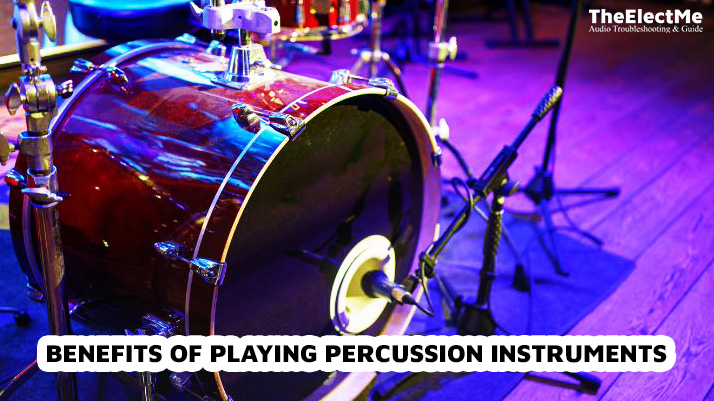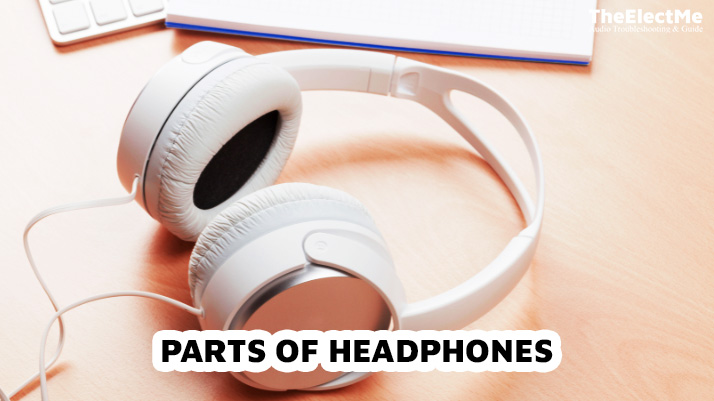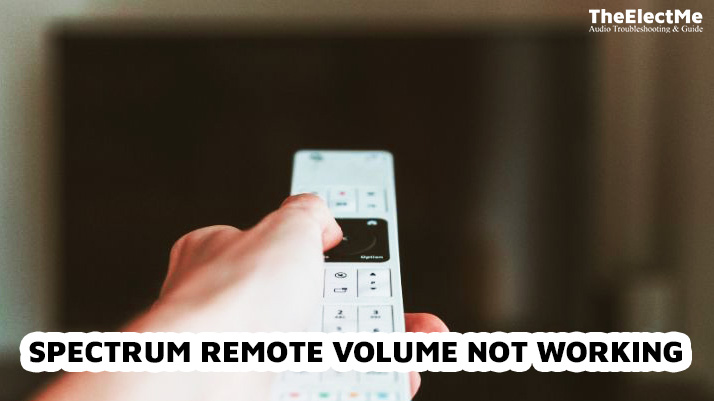According to recent studies, playing a musical instrument has numerous benefits for physical and mental well-being. It enhances cognitive skills, improves overall mood, and reduces stress levels. Out of all the musical instruments out there, percussion instruments are known to have some unique advantages.

Percussion instruments are not just drums but much more than that. It includes musical instruments such as cymbals, tambourines, triangles, and xylophones. The benefits of playing percussion instruments are not limited to having fun or making music. They stretch out far beyond that and can positively impact various aspects of your life.
Discover the top nine benefits of playing percussion instruments and why it’s great for all ages! Let’s start with the instruments in percussion families.
What Are Percussion Instruments?
Percussion instruments are a type of musical instrument played by striking, shaking, or scraping. They can be either pitched or non-pitched and are categorized into several families:
- Membranophones (drums)
- Idiophones (cymbals, triangles)
- Chordophones (xylophones)
- Aerophones (whistles, horns)
- Electrophones (electronic drums)
Percussion instruments are not just limited to one type of sound. They can produce various sounds, from rhythmic beats and tones to melodic patterns. Let’s dive into the top nine benefits it can offer.
Physical And Mental Health Benefits Of Playing Percussion Instruments
Physical and mental health should be a priority in everyone’s life. With percussion instruments, you can improve both. Here are the top nine benefits of playing percussion instruments:
1. Enhances Coordination and Motor Skills
Playing percussion instruments like drums and tambourines can enhance coordination and motor skills. Research from the Journal of Indian Psychology suggests that when individuals play a set of percussion instruments, their coordination ability between arms and hands improves significantly.
Additionally, findings from the International Journal of Indian Psychology indicate that the acquisition of percussion instruments can improve sensorimotor coordination skills.
Moreover, the study published in the Frontiers in Psychology revealed that Orff-based music training, which involves percussion instruments, enhances children’s manual dexterity.
These insights show how playing percussion instruments helps develop coordination and motor skills.
2. Stress Reduction and Mood Improvement
Playing percussion instruments like drums and tambourines reduces stress, lifts mood, and enhances well-being. Studies reveal that rhythmic drumming can lower cortisol levels, reducing stress.
The ScienceDirect article discusses how body percussion with the BAPNE method can help reduce stress and anxiety.
Research from Submit4Journal indicates that music, especially with strong percussion, may reduce stress, enhance mood, and increase dopamine levels.
Moreover, Google Books highlights the role of percussion instruments in relieving stress and boosting mood. When playing percussion instruments, individuals focus on creating music. It helps distract them from daily worries, reducing stress levels.
3. Physical Fitness and Muscle Strength
Playing tambourines contributes to physical health benefits, including improved range of motion and muscle strength.
Research from the Journal of Indian Psychology indicates that percussion instruments can improve muscle coordination, especially in the arms and hands.
The bimanual coordination required for playing percussion instruments, like drums and xylophones, can also improve muscle strength. As individuals play these instruments regularly, they build strength in their arms, wrists, and fingers.
Cognitive and Emotional Development Benefits Of Playing Percussion Instruments
Emotional and cognitive development is essential for overall growth. Playing percussion instruments contributes to both aspects in the following ways:
1. Confidence Building
Learning to play percussion instruments, like drums and tambourines, fosters confidence and self-assurance. As children master new rhythms and techniques on percussion instruments, their confidence and self-esteem are significantly boosted.
Moreover, mastering a new skill like playing an instrument boosts a child’s self-confidence, providing them with a sense of achievement and pride. This sense of accomplishment reinforces the belief in one’s abilities.
2. Communication Skills Enhancement
Playing percussion instruments like drums and tambourines is closely linked to improved communication skills. Rhythmic activities like drumming encourage non-verbal communication and expression, fostering a unique connection.
For children, learning percussion instruments can serve as a therapeutic and expressive outlet, aiding in overcoming language difficulties.
Moreover, playing music, including percussion, inspires positive emotions and enhances concentration. This form of non-verbal expression can also help children develop better communication skills.

Social and Community Benefits Of Playing Percussion Instruments
Community involvement and social connections are crucial for well-being. Percussion instruments in a band can help foster these connections in the following ways:
1. Networking and Social Connections
Playing drums fosters connections with others and creates social opportunities. Drumming circles provide a communal environment for people of all backgrounds to unite.
Group drumming activities can form strong social bonds and connections, promoting a supportive and inclusive community. Moreover, these connections can also aid in building a sense of belonging and reducing feelings of isolation.
2. Cultural Appreciation
Playing percussion instruments also promotes cultural appreciation. Different cultures have their musical traditions and percussion instruments that are unique to them.
By learning about these instruments and the cultures they are a part of, individuals can foster a deeper understanding and appreciation for diversity.
Playing music with others from different cultural backgrounds can also promote intercultural exchange and understanding. This can strengthen relationships within the community and promote inclusivity. Moreover, the violin also promotes cultural musical tradition. Violin has many facts that you probably do not know.
Final Thought – Benefits Of Playing Percussion Instruments
To sum up, the benefits of playing percussion instruments are diverse. From improving motor skills to social connections, playing drums and tambourines improves overall well-being.
Whether a beginner or an experienced musician, regularly playing percussion instruments can positively impact cognitive development, so pick up that drum or tambourine and start exploring the rhythmic world of percussion.
Your mind, body, and community will thank you.



